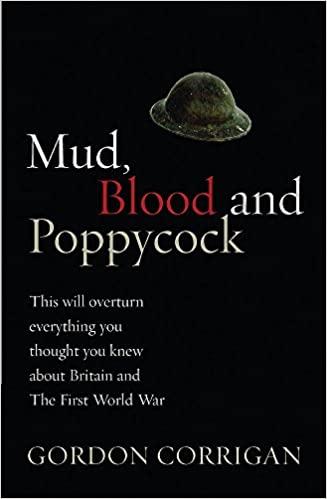Exposing the myths, misconceptions and out right lies surrounding the First World War – Mud, Blood and Poppycock
Mud, Blood – the Blurb
The popular view of the First World War remains that of ‘Blackadder’: incompetent generals sending brave soldiers to their deaths. Alan Clark quoted a German general’s remark that the British soldiers were ‘lions led by donkeys’. But he made it up. Indeed, many established ‘facts’ about 1914-18 turn out to be myths woven in the 1960s by young historians on the make. Gordon Corrigan’s brilliant, witty new history reveals how out of touch we have become with the soldiers of 1914-18. They simply would not recognize the way their generation is depicted on TV or in Pat Barker’s novels. Laced with dry humour, this will overturn everything you thought you knew about Britain and the First World War. Gordon Corrigan reveals how the British embraced technology, and developed the weapons and tactics to break through the enemy trenches.
A pack of lies
The book is broken down in to various chapters each one containing a myth about the first World War: It was unnecessary; there was needless slaughter; every man was knee deep in mud, blinded by gas and left shell shocked. The start of each chapter delivers the crux of this myth, sometimes quite shockingly so:
“America entered the War at the last minute, contributed nothing, and became the only power to make money out of it.”
Corrigan then spends the rest of the chapter illustrating why the statement is incorrect and in this, he doesn’t hold back either. Mud Blood is comprehensive, (it almost reads like a law book when detailing the ‘Kangaroo Courts’). Thorough descriptions about divisions, rations and guns were all interesting and written so they were not too difficult to wrap your head around. Yet the book is clearly written by a man from the Army…who is English. As a result, a slightly more unbiased opinion would have been welcomed occasionally. At times Corrigan made the Western Front sound almost jolly!
“saving shot and shell, the Western Front was a remarkably healthy place to be throughout the war.”
Without doubt Mud Blood is illuminating. I hadn’t realised the true extent of the British involvement in the war, nor the Americans. I was one of the majority who thought the war was all tunnels, mud and gas attacks. It highlighted key men that I was unaware of – Haig for one and without reading any further into his actions in World War Two, Petain. My goodness what happened to him!
It was also full of fascinating little titbits – Did you know London Buses were present on the Western Front? And anyone who has ever watched Only Connect can appreciate how the words “D1, Creme de Menthe and Dinnaken” are screaming out for a connecting round!
It took me a long time to read it – two weeks as opposed to my usual 2 books a week turnaround but I’m going to put that down to lockdown more than Corrigan. It was a worthwhile read but at times you may have to be English to pallet it.

